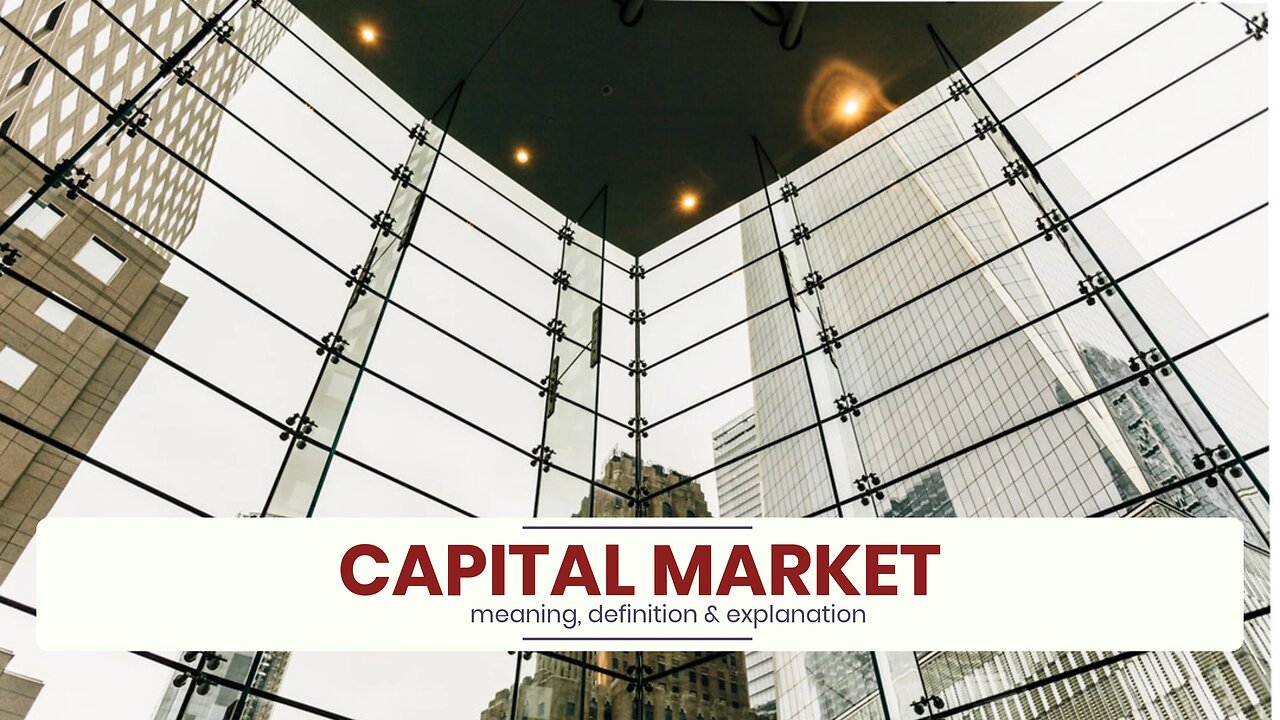Premium Only Content

What is CAPITAL MARKET?
✪✪✪✪✪
http://www.theaudiopedia.com
✪✪✪✪✪
What does CAPITAL MARKET mean? CAPITAL MARKET meaning - CAPITAL MARKET definition - CAPITAL MARKET explanation. What is the meaning of CAPITAL MARKET? What is the definition of CAPITAL MARKET? What does CAPITAL MARKET stand for? What is CAPITAL MARKET meaning? What is CAPITAL MARKET definition?
Capital markets are financial markets for the buying and selling of long-term debt or equity-backed securities. These markets channel the wealth of savers to those who can put it to long-term productive use, such as companies/ governments making long-term investments. Capital markets are defined as markets in which money is provided for periods longer than a year. Financial regulators, such as the UK's Bank of England (BoE) or the U.S. Securities and Exchange Commission (SEC), oversee the capital markets in their jurisdictions to protect investors against fraud, among other duties.
Modern capital markets are almost invariably hosted on computer-based electronic trading systems; most can be accessed only by entities within the financial sector or the treasury departments of governments and corporations, but some can be accessed directly by the public. There are many thousands of such systems, most serving only small parts of the overall capital markets. Entities hosting the systems include stock exchanges, investment banks, and government departments. Physically the systems are hosted all over the world, though they tend to be concentrated in financial centres like London, New York, and Hong Kong.
A key division within the capital markets is between the primary markets and secondary markets. In primary markets, new stock or bond issues are sold to investors, often via a mechanism known as underwriting. The main entities seeking to raise long-term funds on the primary capital markets are governments (which may be municipal, local or national) and business enterprises (companies). Governments issue only bonds, whereas companies often issue either equity or bonds. The main entities purchasing the bonds or stock include pension funds, hedge funds, sovereign wealth funds, and less commonly wealthy individuals and investment banks trading on their own behalf. In the secondary markets, existing securities are sold and bought among investors or traders, usually on an exchange, over-the-counter, or elsewhere. The existence of secondary markets increases the willingness of investors in primary markets, as they know they are likely to be able to swiftly cash out their investments if the need arises.
A second important division falls between the stock markets (for equity securities, also known as shares, where investors acquire ownership of companies) and the bond markets (where investors become creditors).
-
 2:24
2:24
The Audiopedia
1 year agoWhat is AUSTERITY?
83 -
 LIVE
LIVE
Badlands Media
6 hours agoBadlands Daily: August 28, 2025
4,138 watching -
 1:43:15
1:43:15
Dear America
2 hours agoTrans Violence Against Christianity MUST BE STOPPED!!
87.1K74 -
 LIVE
LIVE
Wendy Bell Radio
6 hours agoGuns Don't Kill People
7,248 watching -
 LIVE
LIVE
Matt Kohrs
9 hours agoMarket Open: New Highs or Bust?! || Live Trading Futures & Options
620 watching -
 46:34
46:34
Randi Hipper
1 hour agoWALL STREET'S CRYPTO BET REVEALED! HINT: IT'S NOT BITCOIN!
2.18K1 -
 LIVE
LIVE
The Mike Schwartz Show
1 hour agoTHE MIKE SCHWARTZ SHOW with DR. MICHAEL J SCHWARTZ 08-28-2025
4,152 watching -
 2:04:35
2:04:35
Game On!
20 hours ago $3.07 earnedCollege Football Is BACK! Week 1 Preview!
36.2K2 -
 4:00:18
4:00:18
The Bubba Army
1 day agoMinneapolis Shooter Story Unfolds! - Bubba the Love Sponge® Show | 8/28/25
74.5K9 -
 LIVE
LIVE
JuicyJohns
2 hours ago $0.26 earned🟢#1 REBIRTH PLAYER 10.2+ KD🟢
29 watching